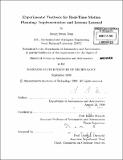Experimental testbeds for real-time motion planning : implementation and lessons learned
Author(s)
Jeon, Jeong Hwan, Ph. D. Massachusetts Institute of Technology
DownloadFull printable version (13.49Mb)
Other Contributors
Massachusetts Institute of Technology. Dept. of Aeronautics and Astronautics.
Advisor
Emilio Frazzoli.
Terms of use
Metadata
Show full item recordAbstract
A fundamental step in research on autonomous robotic systems is the actual development and test of experimental platforms, to validate the system design and the effective integration of hardware and real-time software. The objective of this thesis is to report on experimental implementation of platforms and testing environments for real-time motion planning. First of all, robust planning and control system using closed-loop prediction RRT approach was implemented on a robotic forklift. The system displayed robust performance in the execution of several tasks in an uncertain demonstration environment at Fort Belvoir in Virginia, in June, 2009. Second, an economical testbed based on an infrared motion capture system is implemented for indoors experiments. Exploiting the advantages of a controlled indoor environment and reliable navigation outputs through motion capture system, different variations of the planning problem can be explored with accuracy, safety, and convenience. (cont.) Additionally, a motion planning problem for a robotic vehicle whose dynamics depends on unknown parameters is introduced. Typically, the motion planning problems in robotics assume perfect knowledge of the robots' dynamics, and both planner and controller are responsible only for their own parts in hierarchical sense of the framework. A different approach is proposed here, in which the planner takes explicitly into account the uncertainties about the model parameters, and generates completely safe plans for the whole uncertain parameter range. As the vehicle executes the generated plan, the parameter uncertainty is decreased based on the observed behavior, and it gradually allows more efficient planning with smaller uncertainties.
Description
Thesis (S.M.)--Massachusetts Institute of Technology, Dept. of Aeronautics and Astronautics, 2009. Cataloged from PDF version of thesis. Includes bibliographical references (p. 103-107).
Date issued
2009Department
Massachusetts Institute of Technology. Department of Aeronautics and AstronauticsPublisher
Massachusetts Institute of Technology
Keywords
Aeronautics and Astronautics.